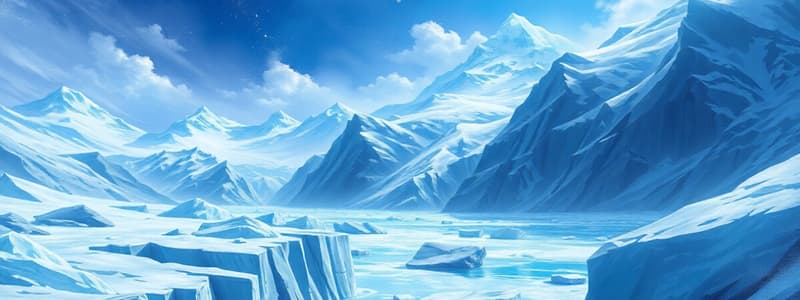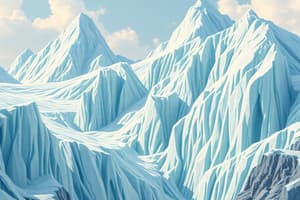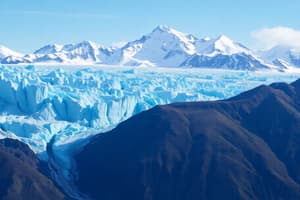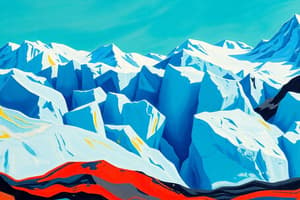Podcast
Questions and Answers
What are the primary agents through which glaciers shape the landscape?
What are the primary agents through which glaciers shape the landscape?
- Weathering and sedimentation
- Chemical reactions and fragmentation
- Erosion and deposition (correct)
- Volcanic activity and sediment transport
Which statement correctly differentiates glaciers from ice sheets?
Which statement correctly differentiates glaciers from ice sheets?
- Glaciers are always larger than ice sheets.
- Ice sheets are present globally in various regions.
- Glaciers are smaller bodies of ice found in colder regions. (correct)
- Glaciers are found only in Antarctica.
What is the first stage in the formation of glacier ice?
What is the first stage in the formation of glacier ice?
- Melting of ice
- Compaction of firn
- Accumulation of snow (correct)
- Freezing of water
How have past glaciations influenced Earth’s geological features?
How have past glaciations influenced Earth’s geological features?
What is a significant climate impact on glaciers?
What is a significant climate impact on glaciers?
What landform is created when glaciers concentrate surface materials near their edges?
What landform is created when glaciers concentrate surface materials near their edges?
Which landform results from meltwater flowing through a tunnel beneath a glacier?
Which landform results from meltwater flowing through a tunnel beneath a glacier?
Which of the following processes is involved in the formation of a kame?
Which of the following processes is involved in the formation of a kame?
What characteristic defines the formation of kettle landforms?
What characteristic defines the formation of kettle landforms?
What is the primary geological impact of glacier movement on landscapes?
What is the primary geological impact of glacier movement on landscapes?
What landform is characterized as a U-shaped valley carved by a glacier?
What landform is characterized as a U-shaped valley carved by a glacier?
What are truncated spurs?
What are truncated spurs?
Which term describes a lake that forms inside a cirque?
Which term describes a lake that forms inside a cirque?
What is the primary effect of high latitude on glacier formation?
What is the primary effect of high latitude on glacier formation?
Which glacial feature forms when two cirques erode a mountain peak?
Which glacial feature forms when two cirques erode a mountain peak?
What is rock flour?
What is rock flour?
Fjords are defined as:
Fjords are defined as:
What type of landscape feature results from differential erosion on rocks of varying hardness?
What type of landscape feature results from differential erosion on rocks of varying hardness?
Flashcards are hidden until you start studying
Study Notes
The Cryosphere
- Refers to the portion of the Earth's system that consists of frozen water
Glaciers
- A body of ice on land that is in motion
Glacier vs. Ice Sheets
- Glaciers are found across the world, particularly in cold, mountainous regions
- Ice sheets are only found in Greenland and Antarctica
- Ice sheets are massive (>50,000 km2)
- Glaciers are smaller bodies of moving ice
Glacier Formation
- Snow falls and accumulates over time
- Snow becomes denser and compacts into firn
- Firn turns into glacial ice due to pressure
Glacial Erosion
- Glacial erosion is the wearing away of land by glaciers
- Glaciers can erode rock and carve valleys
- Glacial erosion forms a variety of landforms, including:
- Glacial troughs
- Truncated spurs
- Hanging valleys
- Cirques
- Horns
- Arêtes
- Rock steps
Glacial Deposition
- Glaciers deposit sediment as they melt
- These deposits form a variety of landforms, including:
- Moraines
- Drumlins
- Eskers
- Kames
- Kettle lakes
Mountain Glaciers
- Tarns are lakes that form inside cirques.
- Fjords are glacial troughs that are filled with seawater.
- Rock flour is a fine-grained sediment that is carried by glaciers and can be moved by wind and water.
Global Distribution of Mountain Glaciers
- Mountain glaciers are found in high latitudes and high altitudes
- Ideal conditions for glacier formation include:
- High latitude, meaning cold regions
- High elevation, meaning cold temperatures
- Low summer temperatures, which limits melting
- Some snowfall, which increases accumulation
Formation of Glacial Landforms
- Glacial Troughs - These are U-shaped valleys carved by glaciers. They are much straighter and less winding than river valleys.
- Truncated Spurs - These are ridges that descend towards a valley from a higher elevation. They are eroded by glaciers, creating a distinct, truncated appearance.
- Drumlins - These are streamlined, elongated hills shaped by glaciers. They form when sediment is partially eroded and compressed under glacial ice.
- Eskers - These are long, winding ridges of sand and gravel that form from meltwater flowing through tunnels beneath a glacier.
- Moraines - These are ridges of unsorted rock debris deposited by a glacier, such as a lateral moraine or terminal moraine.
- Kames - These are small, conical hills of sediment that form when meltwater enters a vertical hole in a glacier, depositing sediment as the water flows.
- Kettle Lakes - These are depressions in the land that form when a block of ice is left behind by a melting glacier, creating a pit that fills with water.
Studying That Suits You
Use AI to generate personalized quizzes and flashcards to suit your learning preferences.




